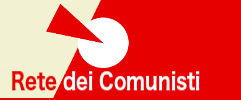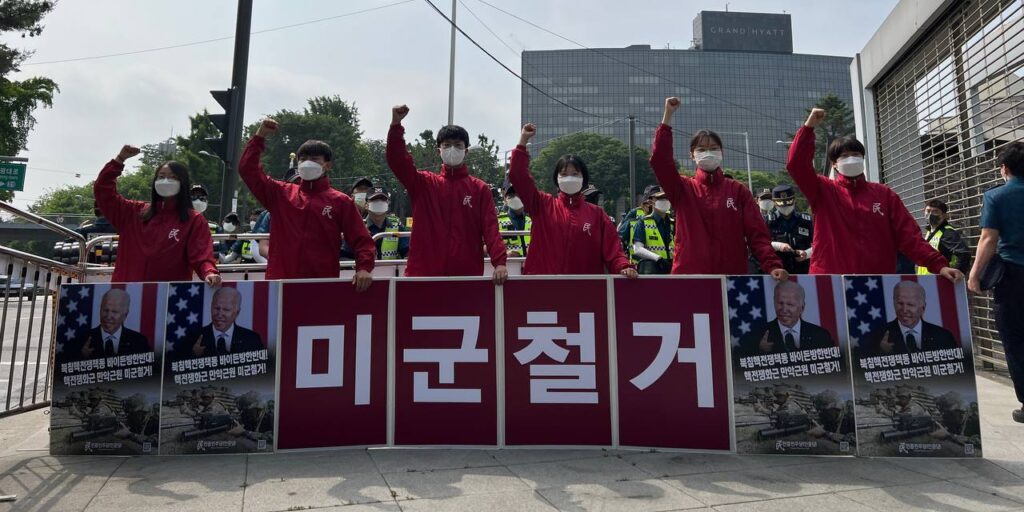| italiano | francese | inglese |
On October 14th, we were invited to participate in the International Congress ‘Towards an Anti-Imperialist Platform’, which was held in Paris and attended by many communist organisations and parties from different parts of the world to discuss ‘The Rising Tide of World War and the Tasks of the Anti-Imperialists’. Below is our speech, in which we analysed the current context in the light of the theoretical analysis work carried out as Rete dei Comunisti over the years on the structural crisis of the Capitalist Mode of Production and a new political and economic phase in which the characteristics of the international confrontation are gradually being defined.
Rete dei Comunisti
We thank the comrades of the People’s Democracy Party (PDP) of South Korea for the invitation to this international conference and for calling numerous communist parties and organisations to the debate in a spirit of internationalist exchange and action against Euro-Atlantic imperialism.
We are facing a situation where the military escalation of the war has reached a sensitive point and risks turning into a catastrophe for the whole of humanity. At the recent G7 summit, NATO Secretary General Stoltenberg officially stated what we have been saying for a long time: ‘Russia’s victory would be a defeat for NATO’, which means that we are directly involved in the war and that the clash is between the Western bloc and Moscow. Therefore, we cannot accept any equidistance, let alone a reduction to the same level of objective responsibility for the situation we are experiencing.
As Rete dei Comunisti, we have always proposed a theoretical analysis and multiple interventions of political and social struggle, through all our structures, to bring forward a strong claim against the European Union – our imperialist pole in the process of being strengthened – and the interference of the USA and NATO, which since the end of World War II have more than 130 missile bases in Italy, some nuclear and secret. It is precisely from the base of Ghedi, in northern Italy, that the planes of the NATO exercise will depart, simulating an incursion with a nuclear attack.
The war in Ukraine is neither an isolated nor a sudden phenomenon, but should be read in the war tendency proper to the crisis of the Capitalist Mode of Production. The flight of the US and its allies from Afghanistan in August 2021 marked the end of an epoch, with the US redefining its international intervention in an attempt – with difficulty – to counter a hegemonic decline that is now indisputable in commercial, monetary, military and even ideological terms in a new phase of global inter-capitalist competition.
Therefore, alongside the mobilisations that we have built and will continue to articulate in Italy and in the various international contexts in which we are present, we are faced with a historical change of phase, and this will engage us in the coming months with a new moment of analytical and theoretical elaboration and deepening in continuity with the previous phases of analysis related to the development of the Capitalist Mode of Production.
We have entered a phase in sharp discontinuity with previous ones, as reality is manifesting itself and as we have repeatedly stated, including in the issues of our magazine Contropiano on “The Stalemate of Imperialisms” and “The European Union: from pole to imperialist superstate?” that will soon be available in English and French on our website. In what we have called the ‘stalemate of imperialisms’ the globalisation mechanism that developed in the 1990s up to the global financial crisis of 2007/08 was already jamming on the basis of the contradictions identified by our Marxist reading, leading to a process of slowdown and reversal of globalisation.
Today, the Rete dei Comunisti, with its role in action on the three fronts of struggle, is aiming to conduct a political-theoretical battle made necessary by the qualitative leap that the rupture of capitalist globalisation is producing. In fact, two main blocs – one Euro-Atlantic and the other Euro-Asian – together with other parallel aggregations that lie between these two poles of contradiction are concretely taking shape. This process has only just begun in an obvious way and will continue, in a non-linear manner, over the next few years.
We must equip ourselves with a scientific reading key that starts from the historical tendencies of the Capitalist Mode of Production, capable of reading the overall dynamic from above, rather than from the analysis of concrete manifestations and then attempting to go back to the general level. Economic analysis alone as well as geopolitical analysis are unable to grasp the historical movement at work.
We must analyse the concrete dynamics at work, both as trends but also as internal contradictions within the trends themselves. For example, in the definition of the main trend in the Euro-Atlantic area, the secondary contradiction of the trade and monetary competition between the US and the EU does not disappear (just look at the evolution of the euro/dollar exchange rate and the fundamental points of the EU’s ‘Strategic Compass’).
In the ‘concrete analysis of the concrete situation’, the investigation into the comparison of the competitive potential between the Euro-Atlantic and Euro-Asian areas acquires an important place. The Euro-Atlantic area is more homogeneous politically and ideologically as it is in continuity with historically hegemonic colonialism and imperialism. The Euro-Asian ‘bloc’, on the other hand, is more inhomogeneous, starting with its political character as it has been constructed from economic and trade relations, but it manifests a common interest in cooperative integration and de-dollarisation, with subjects that call themselves outside imperialist hegemony.
Faced with the systemic crisis of the Capitalist Mode of Production, the Euro-Atlantic imperialist powers find it increasingly difficult to externalise the crisis factors and thus relaunch a process of capital valorisation. They therefore resort to the old tool of war, through military Keynesianism and sanctions, which in fact proved to be a boomerang. By making the economic and social costs of this military confrontation fall on the popular classes, from inflation to the repression of dissent on the domestic front.
The politicisation and militarisation that is taking place concerns the confrontation between the different areas that are being defined, both major and minor. Numerous countries in Latin America and Africa – considered by US and European imperialism as their own backyard, respectively – are already involved in this process: some of them are still suffering neo-colonial plunder and direct imperialist domination by the US and the EU (over strategic raw materials, but not only), while others are seeking alternative paths and emancipation from the Euro-Atlantic yoke for cooperative and non-competitive development.
Each area defines the political-ideological forms of holding its own economic system. For the West, this has been a mainstay supporting imperialist aggression and military interventions for decades (Afghanistan, Iraq, Syria, Libya, etc.). For the rest of the countries – those not considered as the ‘international community’ by the mainstream media – this process of political-ideological consolidation will be more complex and not immediate.
The reality that is emerging as a trend is that of an economic, monetary and trade multipolarism, external and alternative to NATO-centric unipolarism, with a direct and relevant effect on the capital valorisation processes for the imperialist centres. World value chains will be redefined with their shortening, which will lead to a new transformation of production systems. We have entered a new era, that of ‘hyper-competitiveness’, as Von Der Leyen put it.
The challenge for communists is high, the anti-imperialist struggle indispensable, the construction of a fundamental alternative.
War on imperialist war, out and against NATO, out and against the EU cage.
Paris, October 14th 2022

